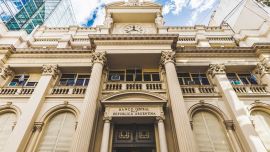Jorge Brito, 67, is synonymous with financial deals as the owner of the country’s biggest bank, Banco Macro. Nevertheless, the self-styled “Peronist banker” voted for Alberto Fernández and has just placed behind his office desk, in his brand-new Retiro highrise, an Argentine flag reading: “Banner of General Juan Domingo Perón which accompanied him from the day of hisexile until his death.”
Claiming “persecution” by the government of Mauricio Macri, during which he had to request leave as director of Banco Macro due to the Ciccone printing-press, he evaluates the exacerbation of the grieta rift to be more serious than the economic heritage left behind by Cambiemos.
But at the same time, he recognises that the banks were clear winners under the previous government.
As for his fortune: “Obviously I’m resident for tax purposes in this country
Have you seen the film El robo del siglo, about the [2006] hold-up in the Banco Río de Acassuso [in Greater Buenos Aires]?
No, I don’t watch much. The last thing I saw was [the Netflix production] Los dos papas, about the two popes.
Those who have seen the film ask themselves: ‘Which is the bigger crime, to found a bank or to rob it.’ What would your reply be?
I swear I never heard that, I’m semi-muppet.
How would you evaluate the [Alberto Fernández] government?
Any economic evaluation is subjective. For me it was important to demonstrate, with the Economic Emergency Law, that Argentina needs to balance its budget and trade. Beforehand the twin surpluses were debated in the world but no more.
In order to distribute you have to produce and to produce you need a country with a fiscal surplus, or be the United States whose financing comes from elsewhere. You have to attract investments to create jobs so that workers can earn decent wages and consume, thus making the wheel go round.
That’s what the president has said and while he was in the government, it was always so with twin surpluses.
What mark between one and 10 would you give the government so far?
I’m not one to give marks to anybody. I understand that they’re on the right path.
Unfortunately, the previous government left Argentina in an appalling economic situation so that rebuilding the productive apparatus and real wages is not going to be easy.
It’s on the right path to get what we need as a country, decent wages.
Some of your establishment colleagues were frightened by the return of Kirchnerism. Do you share that? You suffered ‘escrache’ exposure protests for buying dollars, with Cristina Fernández de Kirchner against you.
A businessman does not have to suck up to the sitting government. If the president invites me to coffee one day and I say my piece and the president gets annoyed and says that you’re at the head of a run on the currency, that doesn’t trouble me.
The Kirchnerite governments never persecuted me. They said things about me, yes, that’s public knowledge. One thing is when you talk about somebody, giving your opinion, and nobody likes being bad-mouthed by the sitting government. But it’s quite another when you’re judicially persecuted and I didn’t feel that then, whereas I did during the Macri government.
So you’re saying that Macri persecuted you judicially?
I’m a person who tries not to hold grudges, I’m talking about the previous government.
But the Ciccone case investigation advanced because a whistleblower, Alejandro Vandenbroele, said that you were paying him off not to talk about your role in the transaction, apart from the fact that a former manager of your bank, Máximo Lanusse, was in charge of the printing-press.
Vandenbroele did not come through as a protected witness, nothing he said could be proved and a year has already gone by. The appeals court has already ruled that I am no longer indicted.
So you were persecuted by a pro-business government?
I wouldn’t say I was a businessman, that’s just what they call me. But the president maligned all businessmen, he resented them all.
Wasn’t he expressing the views of some sectors of society who see the corporations as privileged?
Quite honestly not. The only privileged businessman was Mauricio Macri. He came to power to clean up his name.
Did Macri have a problem with you?
I never asked him. We’ve known each other for many years. I was president of the Paddle Association when he was vicepresident. I know him very well but since he became president, we have never spoken.
Is Kirchnerism back or is it a Peronist government?
Peronist, I don’t like to speak of Kirchnerism, which forms part of Peronism. When Peronism was disunited, it lost the elections.
Have they come back better?
That’s not what it’s about. I’m Peronist and believe in Peronism. As General Perón said, it’s a movement of left and right.
Did you help your friend Sergio Massa make the decision to join Frente de Todos?
We talked about a lot of things. I’m a friend of Sergio and his family, whom I really like. I’d obviously be lying to you if I said that when I talk to somebody, I don’t tell them that a united Peronism a necessity.
Are there many Peronist bankers?
I don’t know, I don’t think so (while flashing a Peronist V sign).
When did you become Peronist?
Before entering the Engineering Faculty of UCA Catholic University where my militancy began in the Peronist Youth branch (JUP-UCA). There were just five of us (laughs).
As a Peronist you voted for …?
... Alberto.
In January, 2016, you said that in broad lines you were in total agreement with Macri and that it was up to Macri whether Cristina came back or not. What happened?
The four years of Macri were very bad news for Argentina, not only economically, where it is easy enough to go wrong, but because they widened and deepened this grieta rift, which is the worst thing which could happen to Argentina.
You backed Néstor Kirchner and opposed Cristina, it is true, but then you praised Macri and now you support Alberto Fernández. Doesn’t that warrant being labelled a progovernment businessman?
I believe in Argentina and have all my assets invested here. I think that if I’m ever summoned by the president or a minister, I have to tell the truth. And if they call me progovernment because of your interview, I’ve told you the truth. I’m not looking for anybody to applaud or curse me, I couldn’t care less. I say what I think. If being progovernment is saying that right now I’m full of optimism for Argentina’s future, then I’m pro-government.
Will Alberto take charge or will Cristina take over?
I think the president is in charge.
As a Peronist banker you must know that Peronism cannot have two leaders.
Of course, Peronism always had one single leader. Nobody discusses CFK’s leadership but she has delegated her position as president of the Republic to Alberto Fernández, who carries it out.
Argentina’s future will be the success of Alberto’s government, which will go positioning him as the leader of Peronism. Nor will he have Cristina against him so that things go wrong. I don’t understand such conspiracy theories.
Jorge Brito on banking, greenbacks and debt
How do you see the renegotiation of the debt with its March 31 deadline?
That’s central. In order for Alberto to have good economic management to start growing and creating jobs, we need to renegotiate the debt and I understand that everything’s heading that way. The previous government had to go to the International Monetary Fund with the IMF dictating austerity while this government understands voluntarily that it must balance the budget.
That’s a difference which the president singles out – he is ordering the accounts out of conviction. As for March 31, the renegotiation might be in progress by then but not closed. I hope I’m wrong.
What impact would a default on the Buenos Aires provincial debt have?
That would be bad news for the national government and everybody. I understand that a solution will be reached.
You told me in 2016: “Kicillof doesn’t understand the first thing, he thinks three people run the exchange markets.”
I didn’t get on well with Kicillof in those times but, as I’ve told you before, I’m a person of dialogue and I’ve had several talks with Kicillof in the last couple of years, he’s a smart guy.
Perhaps we think differently but he’s learned a lot.
You say that there was an economic disaster plus more grieta under Macri but you only have to look at the Bloomberg reports to see how much banking earned in those four years.
That’s very simple. All the money coming into the country, in general terms via the banks. What happened in those four years? A lot of money entered from abroad with the dollars sold and placed in pesos, earning 30 to 40 percent from the Central Bank and then leaving. The banks placed this money in those bonds and instruments created by the government for speculative capital coming from outside. This was not even instead of lending it to the productive sector because the latter could not take these loans. Either I placed the money or took it home with me or put it into Lebacs (Central Bank bonds).
Many bankers thought they weren’t going to pay up but if you administer funds, you have to invest in something – that was the profitability for the banks. Now the companies are going to have to make important adjustments from the Macri era, look at the balance sheets and you will realise.
Will there be more companies coming up with financial problems than we have seen in the last few days?
That’s the tip of the iceberg. Hopefully Alberto can quickly put the economy back on track and everything will be easier but we’re going to have to refinance many companies.
The Central Bank is trying to push interest rates down but that doesn’t seem to be happening.
They’re going down in the short term. But I administer the money of third parties who quote on the Stock Exchange and I cannot be a patriot with your money. This bank lends at 60 percent over 48 months. It might seem high but my deposits are concentrated within a term of 50 days and I’m giving a loan over 48 months. If I can place a sovereign bond which yields the CER coefficient plus 25, I cannot lend money over 48 months – that’s the way it is. If the sovereign bond over 48 flattens the curve, the money will go 40 percent faster into the long term.
Martín Guzmán, 37, knows academic life better than the street and thinks that people like you gobble everything up. Is the Economy minister a greenhorn?
You knew a Domingo Cavallo who took over in 1991, put through a number of reforms and enjoyed absolute power when he left in 1996. That same Cavallo was recalled in 2001 and what did he do? Nothing. Why, if it was the same Cavallo? What changed? The political power.
Obviously you have to have a ton of qualifications to be a minister, but if you do not have a political umbrella from the president, you cannot do anything. That political umbrella is in place here, over and above the suitability of the person.
How do you see the dollar? Is it lagging behind inflation?
You have to look at the exchange rate against when Macri took over in 2015. An exchange rate of 63 pesos per dollar is higher than when Macri devalued and better. You’ve just devalued 100 percent so today you have a very good exchange rate with no problems for exports.
But will it keep up with inflation?
I would imagine that if annual inflation is 35 percent, you’d have to devalue by half that in the next six months. It can be a little less but we should not fall in love with any exchange rate – that must be the anchor.
Are the cepo capital controls here to stay?
Look at Argentina’s exports, US$60 billlion to US$70 billion and look at the debt – there will be cepo for quite a while.
We’ll have to increase exports by US$20 billion to US$30 billion and then we can talk about turning this around. Argentina has no hard currency. Look at the problem of the provinces who ran up dollar debts. They should have been banned from borrowing in dollars.
Do banks need protection against Mercado Pago and Mercado Libre?
That’s a big lie. Banking has always been Argentina’s most exposed sector.
Around 50 years ago I was competing with Deutsche Bank and banks from all over the world who came to invest money. No sector is as open to external competition as the banks.
What has happened is that they have been given privileges. If they don’t pay the tax on bank credits and debit, you’re creating unfair competition for me. I never asked the government to close banking to outside competition and I was president of the chamber for 13 years.
How did Mercado Libre get its tax breaks? Can you explain that to me?
Well, they say it’s because they produce software for their branches and apply it to e-trading.
That’s what they say. If that’s so, OK. I understand that it’s not so.
We’re open to competition, the issue is inequality. It’s like taxis and Uber.related news


















Comments